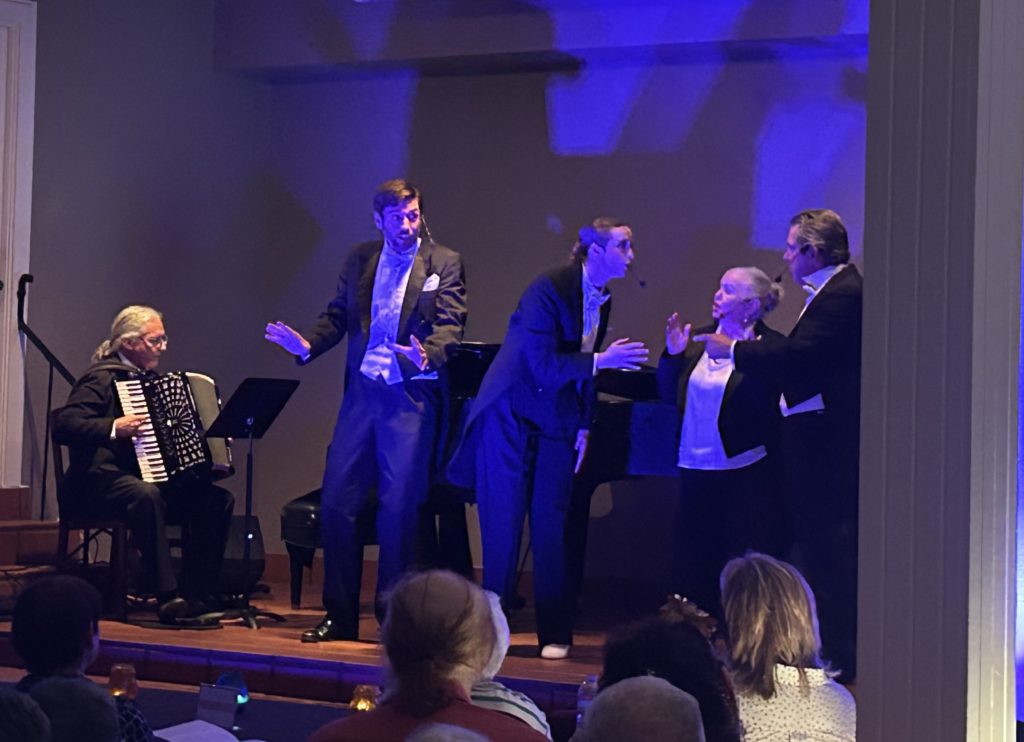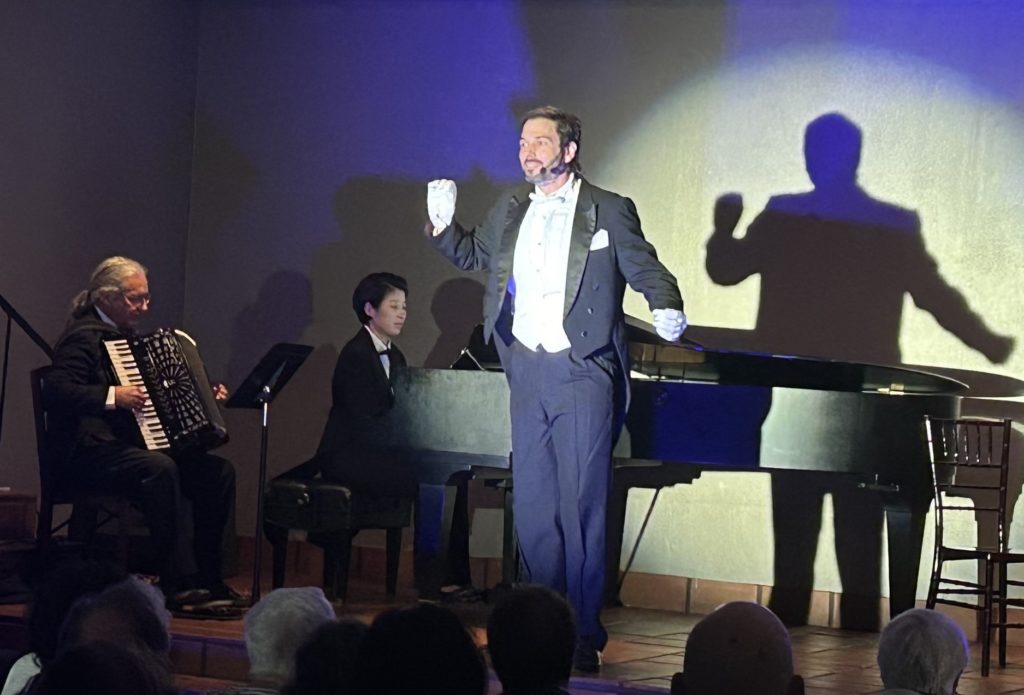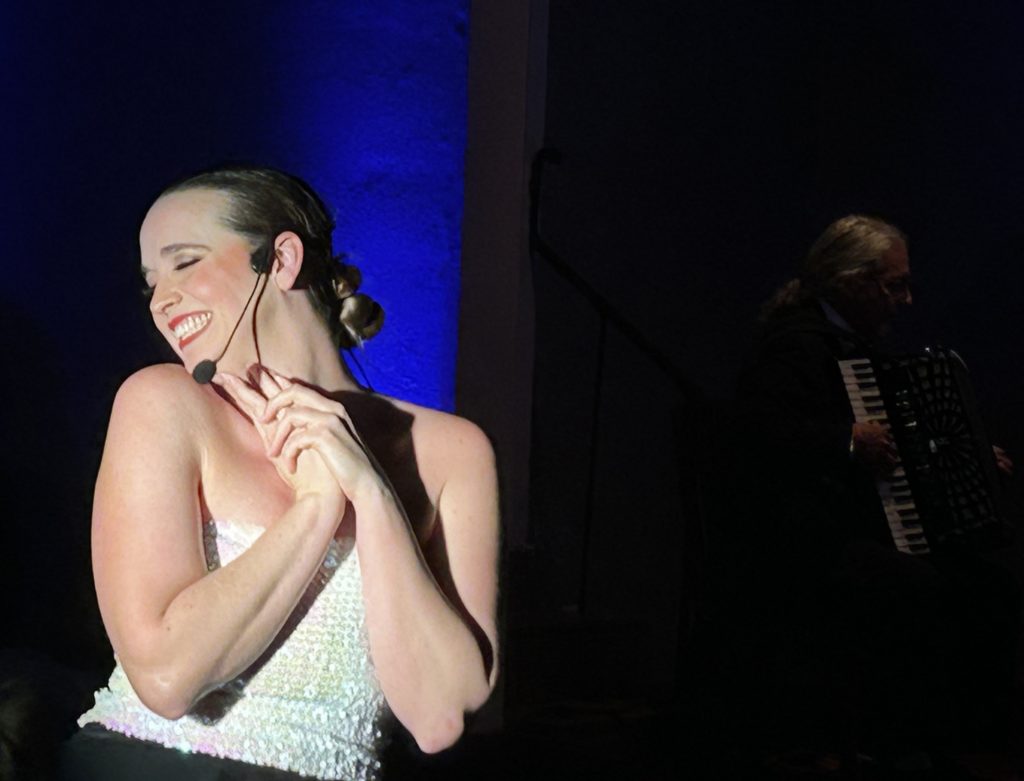Bodhi Tree Concerts Salutes the Lyrical Muse of Kurt Weill
On Saturday, Bodhi Treee Concerts presented Kurt Weill Cabaret, a concert devoted to the songs of the great German composer from the first half of the 20th century. With four accomplished singers and two equally adept instrumentalists, this program entranced a sizable, enthusiastic audience in the social hall of La Jolla’s St. James by-the-Sea Episcopal Church. Traversing Weill’s songs chronologically, the program opened with those written in his native Germany, moved on to three composed in France, and closed with a generous selection of songs written in his final adopted home, the United States of America.

(l. to r.) Mark Danisovszky, Jonathan Nussman, Tzytle Steinman, Ann Chase & Walter DuMelle [Photo courtesy of Bodhi Tree Concerts]
The son of a prominent cantor, Kurt Weill began his serious study of musical composition as a teen-ager, and his 1928 opera written with librettist Bertold Brecht Die Dreigroschenoper (The Threepenny Opera) brought him international recognition. When the Nazis attained power in Germany in 1933, Weill and his wife Lotte Lenya left the country, first settling in Paris, but after a few years in France, they wisely decided the only safe place was America.
Once established in the U.S., Weill continued to produce works for the American musical theater, collaborating with noted American writers: Ogden Nash, Moss Hart, Maxwell Anderson, and Langston Hughes. Weill adapted his musical style for the American musical theater, but the subjects of his musicals proved too sophisticated for American audiences. The plot of his 1941 Lady in the Dark written with Moss Hart, for example, is centered around a successful magazine editor who is undergoing psychoanalysis. Poor Kurt did not understand American audiences preferred homespun plots about sturdy homesteaders singing songs with lyrics “as corny as Kansas in August,” as Oscar Hammerstein II so glibly penned.
Four years after Weill’s death in 1950 at the age of 50, Lenya and the American composer Marc Blitzstein mounted a highly successful English-language production of The Threepenny Opera in New York that not only won over American audiences, but gifted its title song “Mack the Knife” to the jazz world, where it nestled snugly among the songs of the Great American Songbook and was recorded by an array of artists such as Louis Armstrong, Bobby Darin, and Ella Fitzgerald.
Appropriately, Bodhi Tree Concerts opened its Kurt Weill program with baritone Jonathan Nussman’s sleek interpretation of the “Moritat vom Mackie Messer,” Weill’s original German-language version of “The Ballad of Mack the Knife.” Nussman’s velvet baritone and elegant German diction smartly narrated the story of the suave villain’s nefarious trade, setting a laudable standard for the evening’s varied vocal excursions.
Soprano Ann Chase matched Nussman’s sneering innuendo in her saucy account of “Pirate Jenny,” Blitzstein’s clever translation of the original “Seeräuber-Jenny” song—also from Die Dreigroschenoper—that recounts the revenge exacted by a clever chamber maid on the men who have abused her.
In Paris in 1933, Brecht and Weill again collaborated in Die sieben Todsünden (The Seven Deadly Sins), usually described as a “satirical sung ballet,” from which the song “Neid” (“Envy”) was composed as a sermon against this vice. Tzytle Steinman gave a breathtaking, chilling account of this diatribe aptly structured with threatening angular themes that tested the gamut of Steinman’s ample mezzo-soprano. Her arch interpretation allowed the audience to take the text’s warnings about the dire results of envy literally–or not. It is seldom clear whether Brecht actually believes the morality he preaches—or if he is mocking its prudery.
Bass Walter DuMelle gave a compelling account of the “Ballade von Cäesars Tod” (“The Ballad of Caesar’s Death”) from the 1933 play Der Silbersee. The text by Georg Kaiser not only describes the murder of the Roman emperor but discusses the morality of those who accomplished the deed. Who but Weill could find in such didactic prose a prompt for lyrical composition?
The program’s first half closed with a rousing ensemble rendition of “Alabama Song” from Mahagonny Songspiel, one of Weill’s more frequently recorded songs. This is the song with the drunkard’s classic refrain, “Oh show us the way to the next whisky bar.”
Weill’s French songs are frequently overlooked, but Bodhi Tree Concerts featured three of the most celebrated songs from that interim in Weill’s life. Tzytle Steinman gave vibrant accounts of the bitter love song “Je ne t’aime pas” (“I don’t love you”) and the dream world of “Youkali,” a realm of peace and harmony that only exists in aspiration. “Complainte de la Seine” fit perfectly Walter DuMelle’s dark bass range, and he articulated this strident French text with uncanny clarity and illumination.
Half a dozen songs from Weill’s American stage works only suggested the depth of this treasure trove. DuMelle’s probing “September Song” from Knickerbocker Holiday served as a symbol of the composer’s struggles in his adopted country, as did “I’m a stranger here myself” from One Touch of Venus, belted with supreme confidence by Tzytle Steinman. Jonathan Nussman conveyed the existential dread in “Lonely House” from Street Scene, although Weill’s languid arioso cried out for a steady blues beat. Billy Strayhorn could have made Langston Hughes’ “Lonely House” soar. Ann Chase’s spirited “Apple Jack” from Huckleberry Finn, the work left unfinished at Weill’s demise, suggested that Weill was opening up the strain of American folk opera that Carlisle Floyd cultivated in his 1955 Susannah.
Lost in the Stars, Weill’s last completed opera, opened on Broadway in 1949 and enjoyed a successful 9-month run. Based on Alan Paton’s novel about life in apartheid South Africa Cry the Beloved Country, Weill created this musical work with librettist Maxwell Anderson. Opera companies in North America and England have presented Lost in the Stars, and it has been revived on Broadway more than once. DuMelle introduced the work’s title song to close this concert, and he was joined by the other vocalists in a stirring finale.
The singers were provided musical support both lavish and stylish by pianist Yewon Lee and accordion virtuoso Mark Danisovszky. I never tired of Lee’s deft staccato touch, a hallmark of Weill’s accompaniment style, and Danisovszky’s descants and dulcet sonority enriched the texture of every song. Lee and Danisovszky also served as music directors, and the program’s sophisticated polish attested to their good work. Pam Stompoly-Ericson was responsible for the performers’ uniform style: men’s black formal attire that reflected the musical era well.
This concert was presented by Bodhi Tree Concerts on September 21, 2024, at St. James Hall, La Jolla, CA.

Ken Herman, a classically trained pianist and organist, has covered music for the San Diego Union, the Los Angeles Times’ San Diego Edition, and for sandiego.com. He has won numerous awards, including first place for Live Performance and Opera Reviews in the 2017, the 2018, and the 2019 Excellence in Journalism Awards competition held by the San Diego Press Club. A Chicago native, he came to San Diego to pursue a graduate degree and stayed.Read more…



Ken’s interesting and enjoyable reviews are like lessons in music history. Before reading this one, I knew nothing about Kurt Weil. Thanks, Ken.
Beautifully written – Thanks – one of my favorite popular composers.
As a composer, Weill is not easy to categorize with a single adjective. Early in his career he wrote symphonic and chamber music that certainly qualify him as a composer of classical music. We remember him for the songs from his musical theater works that entered the Great American Songbook because of the pop crooners, and later jazz instrumentalists expanded on his melodies in their medium.